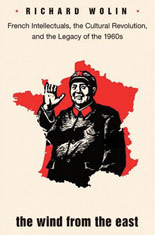
IRIS login | Reed College home Volume 90, No. 3: September 2011
Reediana
Richard Wolin ’74
The Wind from the East: French Intellectuals, the Cultural Revolution, and the Legacy of the 1960s
By Angie Jabine ’79

To many Americans, China is a quasi-totalitarian state turned economic juggernaut. But in the late 1960s, China was something different. For young idealists, Mao Tse Tung’s Cultural Revolution represented a utopian movement, powered by students and peasants—a life-affirming alternative to the sclerotic, corrupt USSR.
Many leading French thinkers were even more credulous than their students. In The Wind from the East, historian Richard Wolin ’74 meticulously describes the influence of Maoism on France’s intellectuals in the run-up to and aftermath of May 1968, when strikes by college students and 11 million workers nearly brought down de Gaulle’s government.
Richard treats Jean-Paul Sartre most sympathetically. Sartre’s Marxist-tinged existentialism was eclipsed in the early 1960s by the structuralism of Louis Althusser, Claude Levi-Strauss, Michel Foucault, Roland Barthes, and Jacques Lacan, which shifted agency from people to the language they use. But when French students hit the streets in 1968, it was Sartre they looked to as an intellectual mentor, and for the next two years he affiliated himself with Maoist journals, joining demonstrations, and writing and testifying on behalf of anti-authoritarian causes.
Foucault was as much the engaged intellectual as Sartre. After May 1968, he and his colleagues challenged France’s still-medieval penal system, drawing on the Maoist example (and America’s Black Panthers) to foment street-level action. Foucault’s analyses of sexuality, though less beholden to Maoism, helped fuel the burgeoning gay rights movement.
Richard is unkinder to Philippe Sollers, founder of the avant-garde French journal Tel Quel, who appeared to hitch his ideological wagon to whichever leftist organization was in the ascendency. In 1974, Sollers, Barthes, and feminist scholar Julia Kristeva flew to China to see the Cultural Revolution for themselves. What they saw on their Chinese junket was carefully orchestrated, and their reports faithfully followed the Maoist playbook.
Not long afterward, those who had blithely worn Mao jackets and quoted his “Little Red Book” were chastened as the murderous zeal of Mao’s Red Guards came to light, followed by the unconscionable regime of Cambodian Communist Pol Pot. France’s public intellectuals relinquished revolutionary dreams in favor of human rights.
The Wind from the East devotes more ink than is necessary to its players’ theoretical sparring, but the author’s energy pulls the reader along, and he convincingly argues that Western-style Maoism made a positive transition into gay rights, women’s rights, and human rights that persists to this day.


LATEST COMMENTS
steve-jobs-1976 I knew Steve Jobs when he was on the second floor of Quincy. (Fall...
Utnapishtim - 2 weeks ago
Prof. Mason Drukman [political science 1964–70] This is gold, pure gold. God bless, Prof. Drukman.
puredog - 1 month ago
virginia-davis-1965 Such a good friend & compatriot in the day of Satyricon...
czarchasm - 4 months ago
John Peara Baba 1990 John died of a broken heart from losing his mom and then his...
kodachrome - 7 months ago
Carol Sawyer 1962 Who wrote this obit? I'm writing something about Carol Sawyer...
MsLaurie Pepper - 8 months ago
William W. Wissman MAT 1969 ...and THREE sisters. Sabra, the oldest, Mary, the middle, and...
riclf - 10 months ago